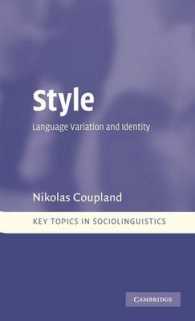Full Description
The complex economic problems of the 21st century require a pluralist, real-world oriented and innovative discipline of economics that is capable of addressing and teaching these issues to students. This volume is a state-of-the-art compilation of diverse, innovative and international perspectives on the rationales for and pathways towards pluralist economics teaching. It fosters constructive controversy aiming to incite authors and commentators to engage in fruitful debates.
This volume addresses a number of key questions: Why is it important for a social science to engage in pluralistic teaching? What issues does pluralist teaching face in different national contexts? Which traditions and practices in economic teaching make pluralist teaching difficult? What makes economics as a canonical textbook science particular and how could the rigid textbook system be innovated in a meaningful way? What can we learn from school education and other social science disciplines? Through examining these issues the editors have created a pluralist but cohesive book on teaching economics in the contemporary classroom drawing from ideas and examples from around the world.
Advancing Pluralism in Teaching Economics offers a valuable insight into the methodology and application of pluralist economics teaching. It will be a great resource for those teaching economics at various levels, as well as researchers.
Contents
List of Contributors. List of Referees. Economics and its teaching at a critical juncture: Introduction, Samuel Decker, Wolfram Elsner and Svenja Flechtner. Part I: Why Pluralism is Important for (Teaching) a Serious Social Science: Foundations. 1 Pluralist economics: is it scientific?, Sheila Dow. 2 Monism in Modern Science: the Case of Economics, Frank Beckenbach. 3 Pluralism in Economics: Epistemological Rationales and Pedagogical Implementation, Jakob Kapeller. 4 In and Against Orthodoxy: Teaching Economics in the Neoliberal Era, Ben Fine. 5 An Outsider's Perspective: What can economics teaching learn from History Didactics?, Astrid Schwabe. Part II: International Perspectives on Pluralist Teaching. 6 Issues in Teaching of Economics and Pluralism in Brazil, Rafael Galvão de Almeida and Ian Coelho de Souza Almeida. 7 Economics Education in India: from Pluralism to Neo-Liberalism and to 'Hindutva', Sudipta Bhattacharyya. 8 China's Idiosyncratic Economics: An Emerging Unknown Monism Driven by Pluralism, Shuanping Dai. 9 The Need for an Independent Perspective: Teaching Economics in Ghana, Hadrat Yusif. 10 Teaching the euro crisis: What do students in Germany and France learn about the causes of Europe's economic crisis?, Philipp Kortendiek and Till van Treeck. Part III: Economic Textbooks: Failures and new Pathways. 11 "Waging the War of Ideas": Economics as a Textbook Science and Its Possible Influence on Human Minds, Silja Graupe. 12 The schoolmaster's voice: How professional identities are formed by textbook discourses in mainstream economics, Jens Maesse. 13 Why economics textbooks must, and how they can, be changed into a real-world and pluralist economics: The example of a fundamentally new complexity-economics micro-textbook, Wolfram Elsner. 14 What can we learn from school economics education?, Janina Urban. Part IV: The Prospects of Pluralism in Economics. 15 Explaining difference and diversity in an increasingly complex economics, John Davis. 16 Towards a critical and transdisciplinary economic science?, Samuel Decker. A Pluralist Economics Teaching is Practicable and Illuminating: A Conclusion, Samuel Decker, Wolfram Elsner and Svenja Flechtner. Index







